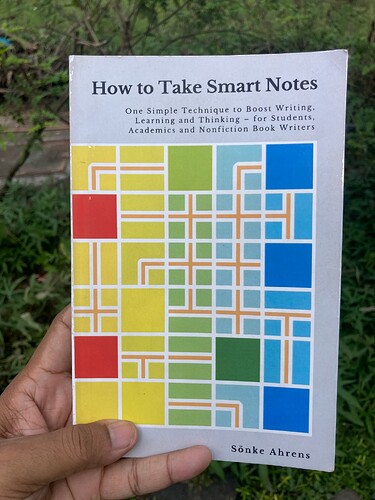How to take Smart Notes, Sonke Ahrens, 2017 – This was a small but powerful read and I would highly recommend it for anyone who reads a lot, or is into academics or dreams of writing a book. It helps to understand the importance of putting what you read in your own words. Writing essentially becomes the medium in which you think. I have personally benefitted a lot from taking notes, writing and making connections across different disciplines so I highly endorse this approach
My notes –
-
Every intellectual endeavor starts with a note
-
Writing is the medium. You don’t write after learning, studying or research – you write while doing it
-
Writing doesn’t start with a blank page – writing starts with notes collected on the subject you want to write about
-
Willpower is a limited resource that depletes quickly – self-discipline or self-control is not that easy to achieve with willpower alone
-
Nobody needs willpower to not eat a chocolate bar that isn’t around. Willpower isn’t needed to do something you would have loved to do anyway
-
When tasks are interesting, meaningful and well-defined and so there isn’t any conflict between long-term and short-term interests, willpower isn’t necessary
-
Not having willpower but not having to use willpower indicates you have set yourself up for success
-
A good structure (workflow) allows you to not force yourself to do anything you dont like. When stuck, you simply do something else. A good structure enables flow where you lose track of time
-
Taking notes is not just about collecting thoughts but about making connections and sparking new ideas (i can’t agree more)
-
GTD – Getting Things Done (Allen) – idea is to collect everything you need in one place and then work on it. All thinking is already done in the notes gathered, so your working memory is free without competing thoughts and you experience a “mind like water”
-
The slipbox – You gather notes in a slipbox – one idea, one note but with varied contexts (categories) with links between notes. This way the notes together are worth more than their sum-of-the-parts (Luhmann method)
-
Notes build up while you think, read, understand and generate – writing is the best facilitator for thinking, learning, understanding and generating ideas
-
Fleeting notes, literature notes and permanent notes (former two have to be converted to this periodically)
-
Write notes as if you are writing for someone else (Reason why I do these book summaries – I am writing for myself in the future – that’s not me but a diff person)
-
Don’t cling to an idea if another more promising one gains momentum (Applies to so many things)
-
Accidental encounters make up the majority what we learn
-
Author recommends using Zotero and Zettelkasten (I feel good old Keep/Evernote/Notion do the job just as well)
-
Many people had idea for shipping container but it didn’t pick up until the self-reinforcing positive feedback loop took over – harbours that could handle containers, more container ships, cheaper shipping, more goods shipped, economical ships, more infra and so on
-
The slipbox is the shipping container of the academic world – single storage type for different ideas
-
Without a permanent reservoir of ideas, you will not be able to develop major ideas over a long period of time due to capacity of memory
-
Writing is not a linear process but a circular one
-
The more connected information we have, the easier it is to learn as new information can dock to that information (latticework of mental models!)
-
Experience is internalising knowledge so decisions don’t have to be consciously thought – they come from the gut via intuition (can’t agree more)
-
Letting thoughts linger while not focusing – say while walking or showering allows brain to be surprisingly productive as it plays around with the last unsolved problem it came across (all my profound thoughts have come to me in the shower, while walking or upon waking)
-
Willpower depletes quickly and needs time to recover – ego depletion – temporary loss of volition due to prior exercise of volition
-
Gates and Obama wear only two suit colors – this means one less decision to make in the morning, leaving more resources for decisions that matter
-
Writing simplifies the understanding and spills over into thinking and also speaking in simple sentences
-
Re-reading or underlining sentences for reading again is ineffectual (like going to the gym to work out with the least effort possible). Writing in your own words is the key (I realised it bit late)
-
Highlights to notes generated by e-reader devices are like fast-food. Neither nutritious nor very enjoyable – just convenient
-
Our perception does not see first to interpret next – it does both at the same time
-
Like martial arts (judo) – when you encounter resistance, you do not push against it but deflect it towards another productive goal
-
Work expands to fit the time we allocate for it, like how air fills very corner of the room (Parkinson, 1957)
-
It doesn’t help to imagine ourselves as winners of a race but to imagine all the efforts, trailing and tools required to win
This is a quick read and since the concept could fit in a blog post, the author draws from different ideas to support the concept in book form. It doesn’t feel like a drag though its a little repetitive since the size of the book is so small. Would recommend to anyone who doesn’t yet write their own notes. The ones that do probably already know the value of doing so. 9/10
| Subscribe To Our Free Newsletter |


